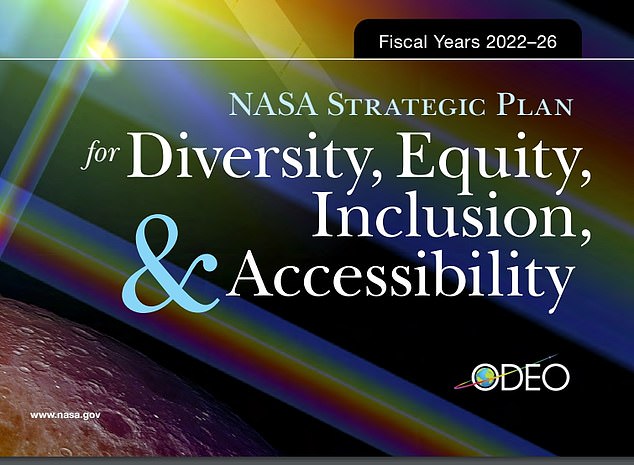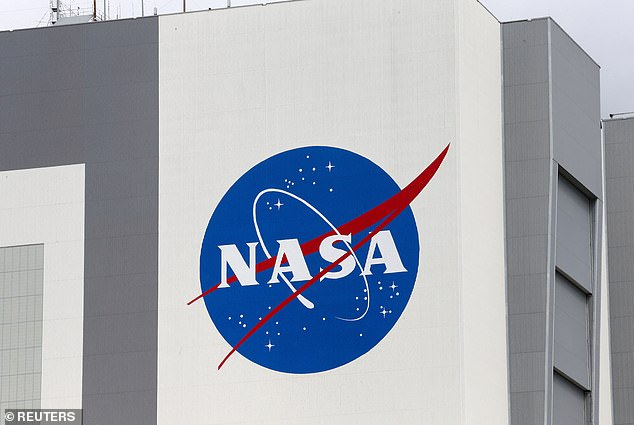NASA staff have criticized the space agency for what they have described as a “DEI takeover” that is compromising the “real work” done by scientists.
One former employee said NASA’s focus on diversity, equality and inclusion is “destroying the United States’ ability to compete with China in space because the Biden-Harris administration will only fund programs that include it.”
Several disgruntled members, who spoke on condition of anonymity, blamed “middle managers” for “silly DEI policies.”
“The DEI issue can create an environment where things are not focused and responsibility is diluted,” said another NASA employee, who still works at the agency.
‘Real scientists don’t give a damn about DEI or other hyperpolitical shit.
‘There are good scientists doing really good work there. (NASA) has become extremely bureaucratic.’
NASA is spending $22.4 million a year on programs involving inclusive hiring, employee resource groups and environmental justice research.
DailyMail.com discovered Millions of taxpayer dollars were spent on DEI data analysis and to help the agency “embark on a journey to embed and deeply ingrain diversity, inclusion, equity and accessibility into culture and business.”
NASA staff blame ‘middle managers’ for the agency’s push toward DEI programs, saying they are to blame for NASA’s downfall.
NASA receives, on average, about 0.4 percent of what the US government spends each year, but still receives a budget of at least $20 billion.
While the space agency has invested millions in DEI, its data showed it generated more than $75.6 billion in economic output across all 50 states and Washington, D.C., in fiscal year 2023.
NASA has been involved in DEI efforts for more than a decade, first creating the Diversity and Inclusion Strategic Implementation Plan in 2012.
In its ‘DEIA Strategic Plan, for the years 2022 to 2026’ it proposes four main objectives: labor diversity; workforce equity and inclusion (employee experience); accessibility and accommodation; and the integration of DEIA into NASA’s mission.
DailyMail.com has contacted NASA for comment.
NASA’s DEI spending from 2022 to the present has largely focused on environmental programs.
More than $1 million in grants went to ‘assess environmental justice in air quality, ‘promote environmental justice in Los Angeles, and ‘examine environmental justice through open source cloud-native tools.’
A grant, of more than $150, was awarded to Cleveland State University to improve urban tree equity monitoring and management.

NASA has requested $22 million each year that would go specifically toward DEI programs
Oregon State University received a commitment of more than $450,000 to study the agricultural decisions of refugees in Uganda.
The grant description showed that the project results “will directly support local reporting on refugee self-reliance called for in Uganda’s refugee response plan.”
It’s unclear how the findings would advance NASA’s goals.
Meanwhile, tens of thousands of dollars were given to the Society of Oceanography to “build diversity, equity, and inclusion in ocean sciences.”
LMI Consulting was awarded more than $2 million in 2023 for NASA to “embark on a venture to embed and deeply ingrain diversity, inclusion, equity and accessibility into culture and business.”
Another $3 million went to Booze Allen Hamilton in March to support NASA’s ‘Office of Diversity and Equal Opportunity DEI Data Analytics Specialty,’ and $7 million was announced last month for six ‘institutions serving the minorities’.
“What I do see is that budgets are tight (so in our case time and planning are affected),” said the NASA employee.
‘We have a difficult project in a very small window. Additionally, I am aware that they have gone through at least two rounds of layoffs this year. I can say that they are very limited and do not work optimally.
Amid these expenses, staff have expressed concerns online about budget shortfalls, citing struggles with “limited funds” due to “wasteful spending.”
‘I worked for NASA and I have friends who still do. NASA has become an inefficient government bureaucracy. It’s sad, but there’s no use denying it,” shared a former employee at X.
William F Cook posted: ‘I grew up in Clear Lake and my mother worked in the space program for 35 years. Even *she* acknowledges that NASA has lost its way and seems to be more focused on DEI and community outreach than going to space.’
A Congressional Budget Office report released in July showed that NASA had nine programs in 2023 that were approved by the government for more than $25 million.
However, the deadline for those authorizations has expired, and yet Congress continues to give NASA money to obtain them.
The space agency had another nine a year later valued at more than $24 million.
“If the expenditure is not authorized, then we should not spend it,” Ramaswamy posted on X last Thursday. “That shouldn’t be controversial.”

